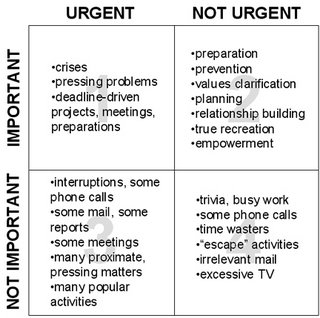
In Steven Covey’s book “Seven Habits of Highly Effective People,” I realized that one of his habits (among others) applies particularly well to how we handle our own financial planning. As we always strive to “be better” than we were last year, I thought it would be helpful to re-visit this idea as a way to help you prioritize your financial tasks. In his book, Mr. Covey uses the graphic below to categorize all activities as important or unimportant, and urgent or not urgent, in one of four quadrants.
While important matters are self-explanatory, the urgent matters are ones we might confuse. The activities that are urgent have an “immediate” quality to them. For instance, visiting a grandmother who is in the hospital with a life-threatening illness, or viewing a television show that is starting right now. Both events are something that has to be done now, the difference is that the first is important – while the second is not. If an activity can be delayed without immediate consequence, it is not urgent. Most people would say that getting their finances in order is important, however, they never get around to taking action. They can procrastinate indefinitely, and there is no sense of urgency that leads to doing it right now.
Stephen Covey’s point is that while everyone does Quadrant I activities first (Important and Urgent), highly effective (read: successful) people do Quadrant II activities next (Important, but Not Urgent). Ineffective people, according to Mr. Covey, spend their time on Quadrant III (Not Important, but Urgent). Quadrant IV is generally avoided by everyone.
It’s important to remember that a key to success is to free up time and energy for Quadrant II activities by eliminating Quadrant III activities. I’ve listed some financial planning activities according to which Quadrant they would typically be placed in:
Quadrant I (Important and Urgent)
- Preparing tax return before April 15th deadline
- Going to work every day
- Contributing to an IRA before the annual deadline
- Signing up for employee benefits before the end of the enrollment period
Quadrant II (Important and Not Urgent)
- Continuing education
- Reading books for self-improvement
- Getting exercise
- Buying insurance that isn’t required (life, disability, etc.)
- Increasing 401(k) contributions
- Doing estate planning (wills, durable powers of attorney, etc.)
- Implementing a financial plan or well-thought-out investment strategy
- Sending referrals to your friendly neighborhood financial planner (sorry, couldn’t resist)
Quadrant III (Not Important and Urgent)
- Checking to see what the market is doing today
- Watching talking heads on CNBC
- Attempting to identify (in the words of Money magazine and its ilk) the “Top 10 Stocks to Buy NOW!”
Spending time efficiently is a major struggle these days. I hope that re-visiting Mr. Covey’s paradigm helps you in your quest for more Quadrant II time. If you have any important financial planning issues that have been put off because they are not urgent, please feel free to contact us – we are happy to help.
Share the Wealth of Knowledge!
Please share this post with family, friends, or colleagues using the links below. We love being introduced!
If you aren’t sure whether your portfolio is positioned properly for the current market environment based on the amount of risk that you’re comfortable with, we always provide a FREE 2nd Opinion Portfolio Review and would be more than happy to discuss your financial planning goals with you – please click here to schedule your meeting, or give us a call at 913.402.6099.
John P. Chladek, MBA, CFP® is the President of Chladek Wealth Management, LLC, a fee-only financial planning and investment management firm specializing in helping families and couples who are not yet retired realize their financial goals. For more information, visit http://www.chladekwealth.com.
